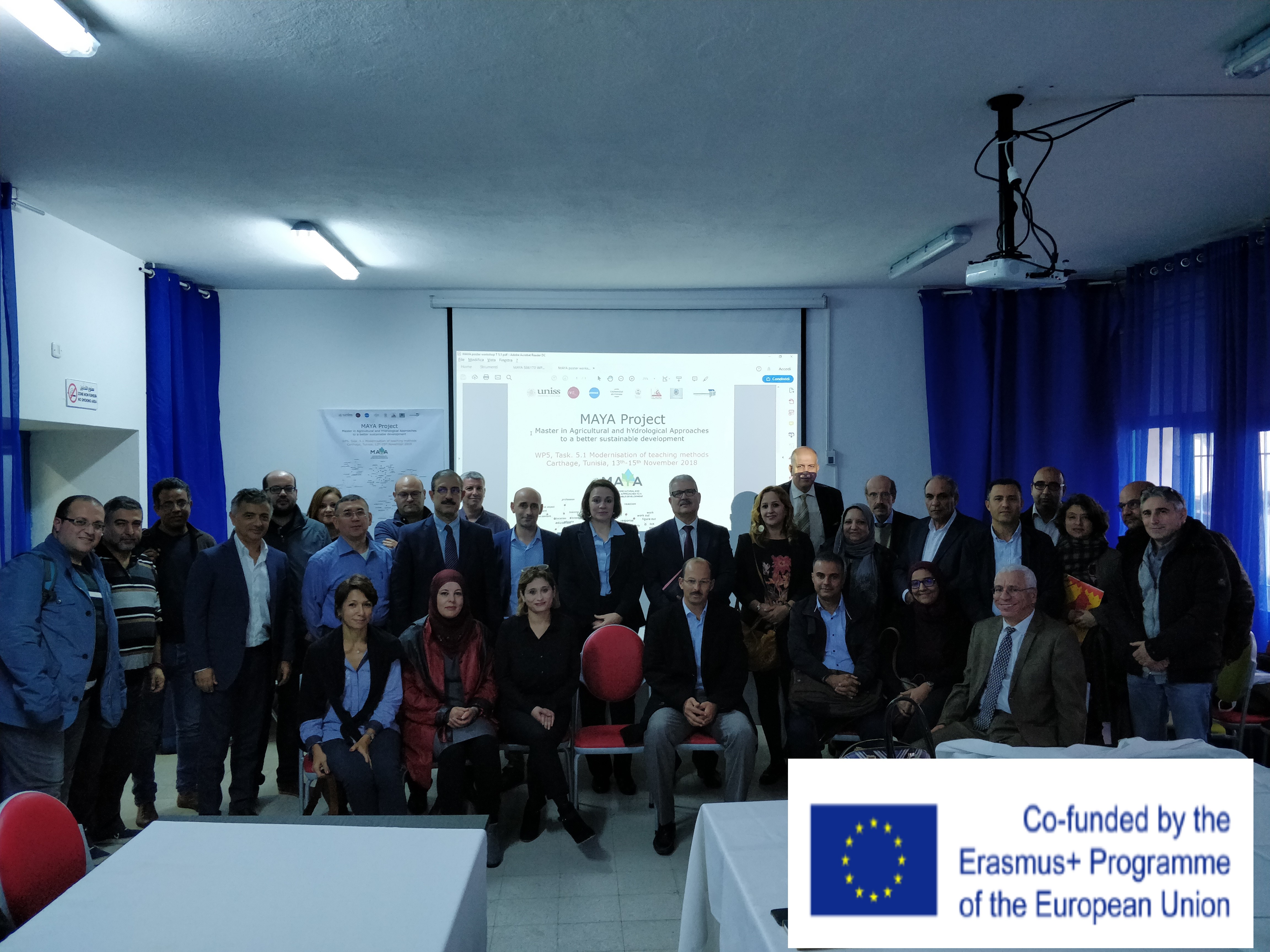Task 1.1 Curriculum Evaluation and Need
In March 2018, the Project Coordinator NRD-UNISS prepared the questionnaires related to the Needs Assessment Task with the support of the Scientific Group (SG). We had an e-mail exchange and Skype calls with all Tunisian partners to define the questionnaire form.
We delivered 4 different questionnaires:
1 for the Curricula Evaluation
1 for the Teachers
1 for the Students
1 for the Enterprises
At the end of April, we defined the final and official version, so the questionnaires were submitted to the participants. The criteria to select the participants (students), as agreed among the members of the SG, was to be for students currently registered at least at the second and not more than the third year of their degree course on subject relates to MAYA topics.
We received and analysed 138 questionnaires from students, 48 from teachers and 16 from enterprises. The results were presented in a series of meetings in July 16th, Universities of Tunis El Manar and University of Chartage and July 17th, University of Sfax. A final report with the questionnaires’ results and the connected discussions will be available in the mid of September 2018.
Task 2.1 Master plan and accreditation
The Tunisian members of the SG have organized two meetings to discuss the contents and topics of the new Master. They chose to carry out a Research Master (the other option was a professional Master). It is a 2 years Master that will start in each HEIs partner.
Tunisian components of SG will meet to finalize the needed documentation
for the accreditation procedures. The new Master course will aim at achieving
international transparency and academic recognition.
This work package aims to develop a new learning environments in each
involved local University composed by an e-learning platform and new
equipment and tools that will be strongly used by both students and
teachers during the development of the Master.
The participatory workshop was held by the University of Carthage at the Institut des hautes études touristiques (IHET) in Sidi Dherif, Carthage, Tunisia from the 13th to the 15th November 2018.
All the partners has provided their contribution for the good result of the activity.
We had slideshow presentations in the morning made by P1, P2, P3 and P4 and roundtable discussions in the afternoon.

The aim of this WP is to implement the new high-quality Master on
Integrated Water and Agriculture Management. Strong communication
strategies will be carried out to emphasize the vocationally inclined
modules of the new Master, the internationalization, the high quality
and the career prospects and opportunities that the participation to the
Master could provide.
The
KOM and the 1st SCM were carried out on the 26th and 27th of February
2018. The SC and Teaching Group are defined. All the Project Partners
signed the bilateral Partnership Agreement.
Task 9.3 Administrative and Financial Management
A
financial training was done in the occasion of the 1st SCM 27/2/2018.
The following day, the MAYA Project Manager met the financial and
administrative officers at UTM and UCAR to discuss and explain the
strategy of the project and the way to manage contracts and funds
according to the EU rules. The contact with the financial and
administrative officers at US, UNIMED, UdG and AUTH are regular.
Task 9.4 Logistic arrangements
A special role in this task will be played by UNIMED’s team since the SC delegated them to the management of travel costs and costs of stay budget. All the partners are collaborating to find the best and easiest arrangement for traveling in safe.
A Special Mobility Strand has been foreseen to support and complement the training of teachers on topics focusing on the integrated management of water, agriculture and environmental resources.
In the period June-September 2019, 26 teachers of Tunisian HEIs participated in 5 days training in Sassari (IT), Girona (ES) and Thessaloniky (EL) to discuss with peers, reach a deeper understanding of the new methods and technologies proposed by the European partners and receive support to analyze Tunisian case studies with the new methodologies and techniques.
7 teachers were hosted by NRD-UNISS to discuss on sustainable agro-ecosystem management and mitigation strategies in relation to climate change;
6 teachers were hosted by AUTH to deepen technical topics on water resources management and policy;
13 teachers were hosted at UdG to focus on water quality management in agro-ecosystems to prevent environmental pollution.
Both institutions (the sending and the receiving) took advantage from the mobility period of Tunisian teachers by benefiting from the exchange of expertise and experiences with the aim to find new opportunities of scientific collaborations.